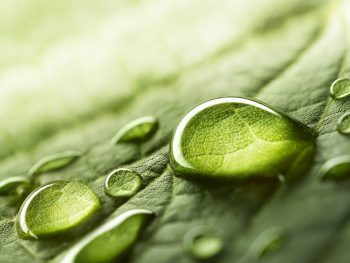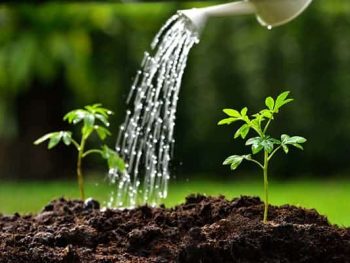
However, at the same time you might be wondering why do plants need water? Of course, we know that it is needed in order to make plants grow, but just how does it do so? Also, what would happen on the cellular level if you choose to either overwater or under-water them?
You probably have many deep, burning questions on this subject, and that is why we are here to help! Read on to find out more in this article on the importance of watering your plants, as we answer some of your frequently-asked questions on the subject. Soon enough, you will be more knowledgeable and an expert on this particular field of gardening.
Without further ado, let’s get started!
What Is Water Made Of?
As you probably have learned in your chemistry class, water is known as H20. Essentially, it is made from two hydrogen molecules and one oxygen molecule which together form both a single and a double bond.
In addition, it has high polarity, which means that there is a positive charge on one end and a negative charge on the other. As a result, it is able to dissolve salts and sugars and be dissolved into other objects, just as soil.
Finally, water has a high boiling point (100°C or 212°F), along with a high vaporization point, which starts to happen at boiling point. It has a lower density compared with ice and freezes at 0°C (32°F).
Why Do Plants Need Water?
Just like with any living thing on this planet, plants need water in order to live. Considering that plants are made from 90 percent, water is crucial to survival. If there is not enough water given to them, then it can result in wilting.
This happens through a process called turgor, which is caused by the water pressure built inside of the stems and leaves. That said, when there is not enough water, the pressure leaves the system and the plants begin to wilt, as seen through their drooping stature.
How Do Plants Grow from Water?

However, another way that plants grow from water is through the process of photosynthesis. Perhaps you have learned about it during biology class back in school, but in any case photosynthesis is a way for plants to produce their own food in order to stay alive.
The process takes place in the leaves where water is stored and later evaporated, and carbon dioxide is exchanged in what is called transpiration. Carbon dioxide enters the plant and from there is made into the plant’s “food” for nourishment. This food is essentially sugar, which fuels the plants to stay happy and healthy.
This entire process takes place during the day, where there is sunlight to help evaporate the water from the plant. At night, it does not happen, and instead has dew until the morning. That is why you see the little watery drops when you wake up in the morning.
How Do I Know If I’m Watering Enough?
Perhaps you know that watering your plants is essential, but just how much water is enough for them? There is not a single answer to this question, for it will depend on the type of plant you have and the environmental conditions of your garden.
As a rule of thumb, all plants (even fungi) will need to have at least some sort of water as means of growing properly. Plants such as lily of the valley and crops like mangoes need a lot of water while things like moss and mushrooms do not need a ton to grow well. Hence, it helps to figure out what you would like to grow in your backyard, as well as research the amount of water it needs in proportion to the sunlight in your environment.
Take Away Message
All in all, water is the essence of life, an important tool to use in order to make your plants, flowers, and crops grow well and healthy. Through chemical processes involving high water pressure and photosynthesis, plants can support themselves by having enough water in their system, which then leads to great results. That said, do not skimp on the water, and let your garden flourish!
I hope you found this article helpful. If you have any orther questions, please let me know in the comment field, and don’t forget to share this article with your friends and family.
Happy gardening!












